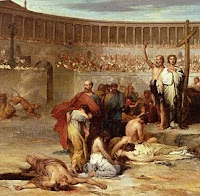Throughout the second and for part of the third centuries, the persecution of Christians by the state was sporadic and localized. Often, mobs were raised by all sorts of rumors about the Christians in their midst. Understandably, Christians saw the need to challenge such rumors and also misconceptions about the beliefs and practices of the church. The great defenders of the faith are known to us as the apologists.
The apologists had to address several rumors about Christian practices that were floating around in the air of the empire. They had to clarify that the references to the eating of the flesh of Christ and the drinking of his blood, did not mean that Christians practiced cannibalism. Their talk of love and their celebration of the Love Feast did not mean that the church engaged in wild orgies (as if the Roman culture had any right to accuse anyone else of sexual immorality). The apologists also attempted to explain that they were not disloyal citizens of the state because they refused to worship the emperor. Their prayers for the end of the world did not mean that they hated their neighbors.
Moreover, in a world where all sorts of deities were worshiped, Christians (and also Jews) were accused of atheism because they worshiped an invisible God. The apologists tried to explain why this was not the case. Since Christians believed only in worshiping the one, true God, they refused to participate in many social practices, which were considered idolatrous. The Romans saw this as a refusal to participate in the basic structures of society. Such refusal, according to Rome, threatened to tear the fabric of Roman society.
More fundamentally, most educated Romans thought of Christianity as a lower-class superstition from an obscure Roman province. The apologists sought to make Christianity intellectually respectable. This normally meant relating Christianity to philosophy because beliefs, such as the bodily resurrection of Jesus and the atoning death of Christ, were considered nonsensical by the pagans.

2 comments:
Thanks for doing this. It sounds interesting to me. I want to link to them, so please let me know when you update just in case I miss it.
Brett:
I will.
Post a Comment